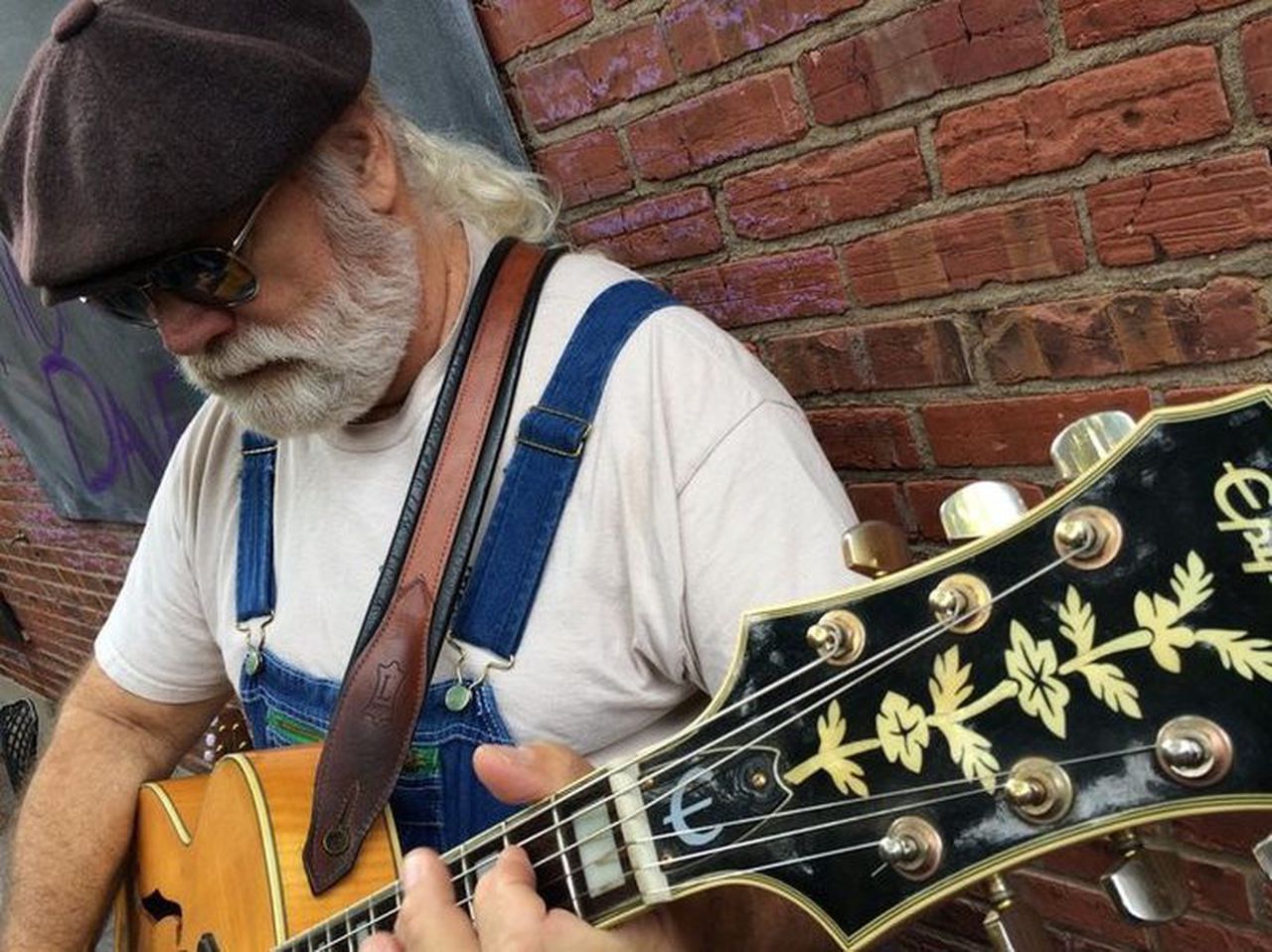Microwave Dave: 10 things you might not know about beloved Huntsville musician
Dave Gallaher decided if he made it back home alive, he was going to play music for the rest of his life. And he was going to play music that made people feel better.
Gallaher did make it back from the Vietnam War, after serving as a U.S. Air Force intelligence specialist from 1967 to 1968. Since then, he’s lived a vibrant and soulful life in music, as illustrated in “I’m a Roadrunner: Life and Times of a Bluesman,” the coffee table book about Gallaher published in 2021.
Gallaher’s music — an articulate, evocative and malleable mix of blues, rock, folk and beyond — continues to bring joy to people to this day. Particularly in Huntsville, Ala., which has been his home since the mid ‘80s and where he continues to gig, including his weekly 6-9 p.m. Thursday solo sessions at The Nook, address 3305 Bob Wallace Ave. S.W. For the past 20 years or so, Gallaher has also hosted his own two-hour radio show, “Talkin’ The Blues,” airing 8 p.m. Saturdays on local public radio station WLRH 89.3 FM and 6 p.m. Tuesdays on Alabama A&M University’s WJAB 90.9 FM.
Huntsville blues musician “Microwave” Dave Gallaher. (Matt Wake/[email protected])
Known by his nickname “Microwave Dave,” Gallaher is Huntsville’s signature and most beloved musician. Since 2015, he’s been honored with Microwave Dave Day, an all-day concert featuring some of the city’s best musicians, with a different lineup each year. In addition to rightly feting Gallaher, Microwave Dave Day has become one of Huntsville’s can’t-miss local music events.
This year’s Microwave Dave Day is set for 3-10 p.m. Oct. 16 at Stovehouse, address 3414 Governors Drive S.W. The event is free to attend, although donations are appreciated and benefit Microwave Dave Music Education Foundation, the nonprofit that provides funds to local musicians to perform in area schools.
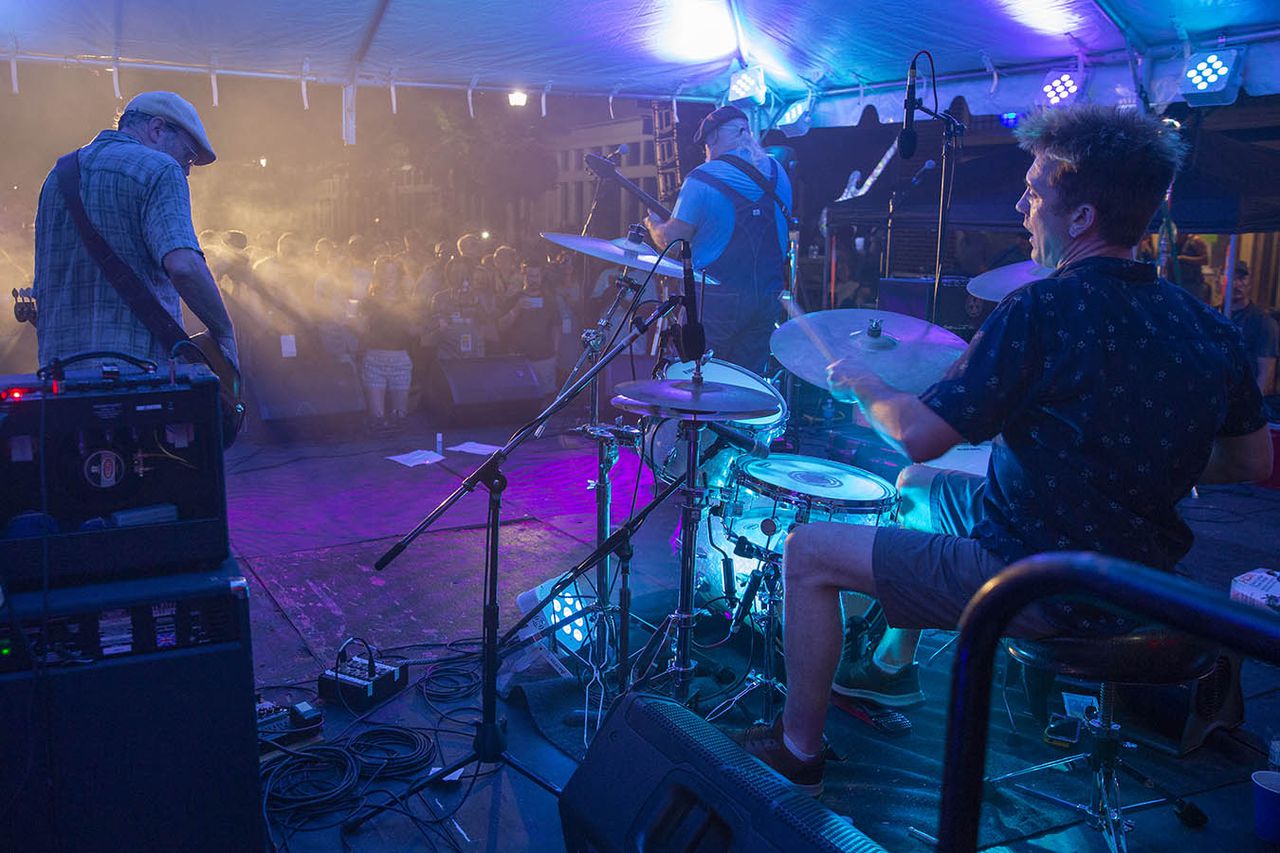
Microwave Dave & The Nukes: From left, bassist Rick Godfrey, guitarist Dave Gallaher and drummer James Irvin. (Courtesy Dennis Keim)
Microwave Dave Day 2022 will feature more than 75 musicians across three different stages on the Stovehouse campus, an entertainment/dining-oriented facility built on the former grounds of a stove factory. Must see performances include: Rising folk-pop duo Common Man (6 p.m. Shed Stage); tuneful indie-rockers Wanda Band (6 p.m. Electric Belle Stage); and an acoustic set by Mike Roberts, of local classic-rockers 5ive O’Clock Charlie, with guests (3:20 p.m. Shed Stage).
Gallaher will team up with drummer Darrell Tibbs and pianist Clay Swafford for a trio set (6 p.m. Main Stage). At 8 p.m. on the Main Stage there’s an all-star jam featuring backing from local rockers The Nerves and Straight to Video. Complete lineup and more info at facebook.com/microwavedaveday.\
These all-star jams are where the magic happens. When top local players who’d normally be on different gigs across town get to throw-down together on the same stage. But before all that, let’s detail some history you might not know about “Microwave Dave” Gallaher.
Vietnam jams
During his time in Vietnam, when off-duty he played guitar in a band called The Rotations. The band’s name came from its ever-changing lineup, due to servicemen in the group “rotating back home.” At night for G.I.s, The Rotations played soul and R&B hits by the likes of King Curtis, Junior Walker, and The Temptations. The band was managed by a stripper from Saigon who went by the moniker Geri Vay. Originally, The Rotations’ gig was to warm the crowd up for Vay’s act. But as the enthusiasm for the band’s live music grew, Vay pivoted to management, getting another band or two going as well.
While serving in Vietnam, Gallaher obtained a guitar and amp for his Rotations gigs from a shop in Cholon, where a man named Lam Hao made Fender knockoffs, as Gallaher recalled to AL.com in 2015. “You would walk in and look up on the wall and see a neck you like, and then walk over to another wall and see a body you like, and he’d pull them down and put them together really quick. String it up and let you play it.”
Although Gallaher eventually made it home safely from Vietnam, his locally made Strat and faux Fender amp didn’t. In summer of ‘68, he received emergency leave to return home to Atlanta, where the Gallaher family had relocated from Texas, to visit his father, who’d suffered a stroke.
After his father passed, Gallaher was reassigned to Langley Air Force Base in Virginia and told he’d completed enough days in Vietnam to receive credit for his tour of duty. He’d left his guitar and amp in Vietnam thinking he’d return to play them again with The Rotations. He never saw those instruments again. Gallaher believes they were likely passed on to whoever took his place on guitar in the band.
School of rock
Post-Vietnam, Gallaher lived in Boston. He studied guitar at the Berklee College of Music, the renowned institution many notable musicians — including Quincy Jones, John Mayer, St. Vincent and Aerosmith’s Brad Whitford — have attended.
While in Boston, Gallaher began playing slide guitar, inspired by Duane Allman’s playing on Aretha Franklin’s sanctified The Band cover, “The Weight.” Slide soon became a key component of Gallaher’s guitar skill-set.
“I liked the fact (slide guitar) had a human vocal quality,” Gallaher told me in 2013. “You can make it inflect like a voice would. It had a soaring quality to it, and a lot of emotions you could express in it.”
In Boston, he joined a rock band called Cameron Company, later shortened to just Cameron. The band relocated to Florida where they enjoyed a dozen-year run in which they cut three albums, including one in Muscle Shoals with Swamper keyboardist Barry Beckett, and played around 300 shows a year.
With Cameron, Gallaher began playing Flying V-style electric guitars. Because of their superior upper-fretboard access, Flying Vs were great for playing slide guitar on. Vs have remained an essential part of Gallaher’s sound, including a 1971 Gibson Flying V he’s had since his Cameron days.
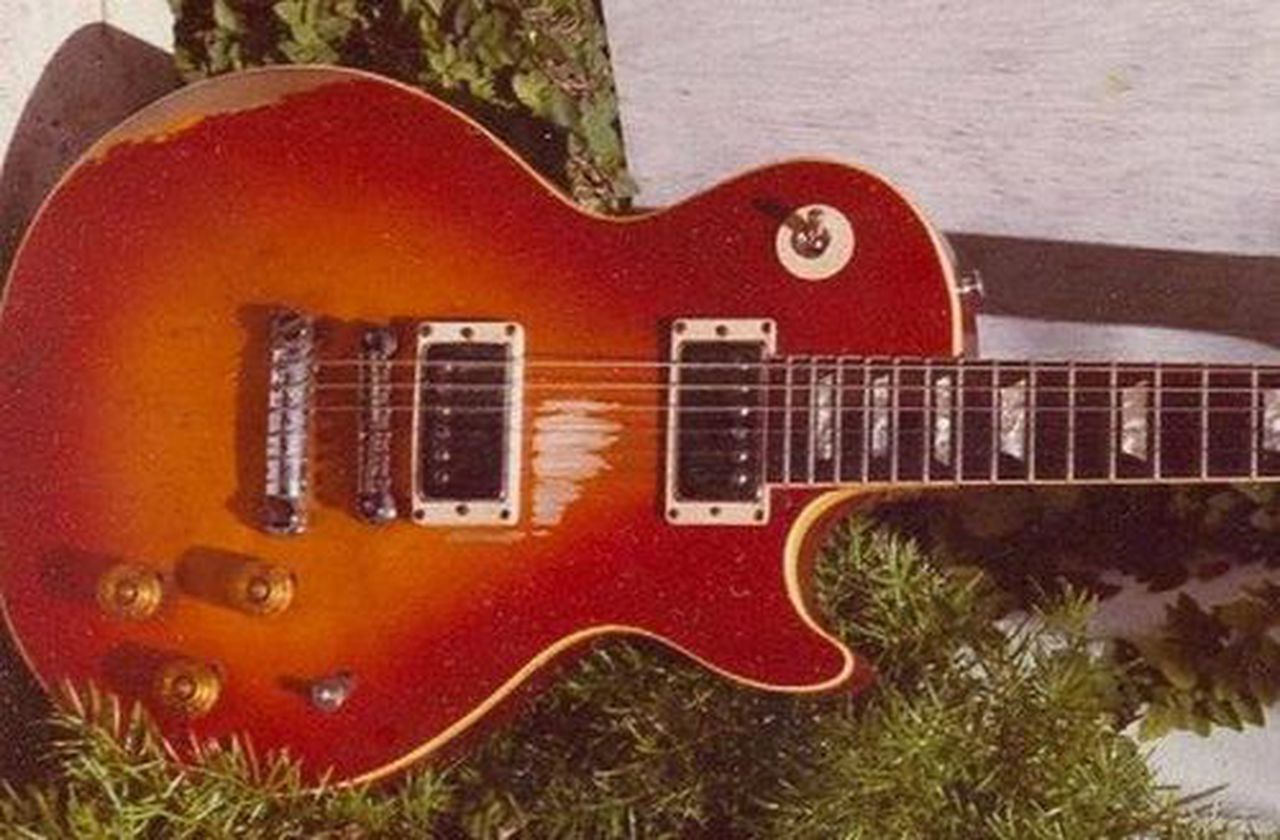
A photo of Dave Gallaher’s 1972 Gibson Les Paul Deluxe that Allman Brothers guitar legend Dickey Betts played the night Betts sat-in with Gallaher’s then-band Cameron in Tuscaloosa during the mid-’70s. As fate would have it, the Deluxe’s mini-humbuckers had to be replaced after that gig. The guitar is shown with the standard-sized humbuckers installed as replacements. (Courtesy Dave Gallaher)
Jammed with Allman Brothers
In the mid-‘70s, Cameron was playing a six-night run of shows in Tuscaloosa at a place called Papa Joe’s. During that run, Southern-rock stars the Allman Brothers Band were scheduled to play a big concert at the University of Alabama.
Cameron’s setlist included early Allmans tunes like “Whipping Post.” But also “High Falls,” a challenging instrumental off the latest Allman Brothers album, “Win, Lose or Draw.”
During one of Cameron’s Papa Joe’s gigs, a man approached Gallaher and said he wanted to introduce him to Dickey Betts, the Allman Brothers guitarist and singer of the band’s biggest song, “Ramblin’ Man.” Gallaher thought the man was full of it.
Until there he was, Dickey Betts. Betts had caught a Cameron set and was impressed by how they played “High Falls” and another Allmans instrumental, “In Memory of Elizabeth Reed.”
Betts ended up getting onstage that night and jamming with Cameron. They brought the house down at Papa Joe’s, which was packed. Afterwards, Betts gave the Cameron band members tickets to the next night’s Allmans show, where Charlie Daniels Band as the opening act. Betts also talked Papa Joe’s manager into allowing Cameron to start next night’s show at the bar a little later.
Gallaher and company caught Charlie Daniels’ set and the first part of the Allmans. Seeing two huge bands like that from the side of the stage was impressive.
“Then we had to go to the gig,” Gallaher recalled in 2018. “We figured that was the end of it. The concert let out and we start to get a lot of people. We’re playing and next thing you know here comes Dickey and Gregg (Allman, ABB singer/keyboardist and Duane Allman’s brother) and Chuck Leavell (Allman Brothers keyboardist) with them.
“We invited Dickey to come up and he played a blues song and said some really nice things on the microphone, like they really appreciated how we honored them by playing their stuff well.
“He says, ‘We’re going to invite a couple of my Brothers up here’ and he introduced Gregg (who Betts referred to as “Blondie”) and Chuck. Gregg walked up onstage on my end and came up to me and said, ‘Man, you’re really getting down to it.’ And it just blew my mind.
“I said, ‘We learned a lot from you and your brother and that’s the way we try to do it,’ and he shook my hand. They started playing and did (Elmore James blues song) ‘The Sky is Crying.’ And then I think they did ‘One Way Out’ (another James song famously covered by the Allmans) if I’m not mistaken.
“Dickey wanted those guys to hear us play ‘High Falls’ so they got down and we went back up and played ‘High Falls’ and ‘Elizabeth Reed’ for them. Our stock went way up in Tuscaloosa after that night. I had a hard time going to sleep.”
What’s in a name
The brand-worthy Microwave Dave stage name was born back in the ’80s at the Kaffeeklatsch Bar, the funky downtown Huntsville spot that shuttered in 2015. That night, Gallaher was there to hear a harmonica player called “Chicago” Bob Nelson. Nelson asked Gallaher to sit in. After singing and playing three or so songs with Nelson, Gallaher got some nice applause from the crowd.
Nelson got on the microphone and said, “Thanks very much, that was Dave…Dave…’ Unable to recall Gallaher’s last name Nelson finally said, “That was Dave the Microwave.”
The Kaffeeklatsch figured prominently in Gallaher’s local arc in other ways too. The ‘Klatsch is also where he began playing gigs with his band The Nukes in 1989. Microwave Dave & The Nukes, whose latter-day lineup feature drummer James Irvin and longtime bassist Rick Godfrey, played countless hot shows there over the decades.
Gallaher played 22 consecutive Thanksgiving Throwdown shows at The ‘Klatsch beginning in 1992. He launched his solo act there in 1993. It was also where he recorded 2004 solo album “American Peasant,” believed to be the first ever live blues album to prominently utilize looping, an effects pedal that allows a musician to create layers of music onstage on the fly.
MORE ON MICROWAVE DAVE & THE NUKES:
The ‘other guy’ in an iconic Huntsville band
Alabama blues legend tells the secrets behind his guitars
The beat behind Huntsville’s signature band
Big in France
Sparked by the ‘80s rise of guitar legend Stevie Ray Vaughan, contemporary blues music experienced a boom which continued even after Vaughan died in a 1990 helicopter crash.
Around 1995, Microwave Dave & The Nukes’ raucous cover of Bo Diddley’s song “Roadrunner” ended up being a soccer-stadium anthem in Paris. This led to opportunities for the band to tour Europe.
At a motorcycle festival in France, Microwave Dave & The Nukes served as the opening act for Iron Maiden, the famous heavy metal band known for songs like “Number of the Beast” and “Run to the Hills.”
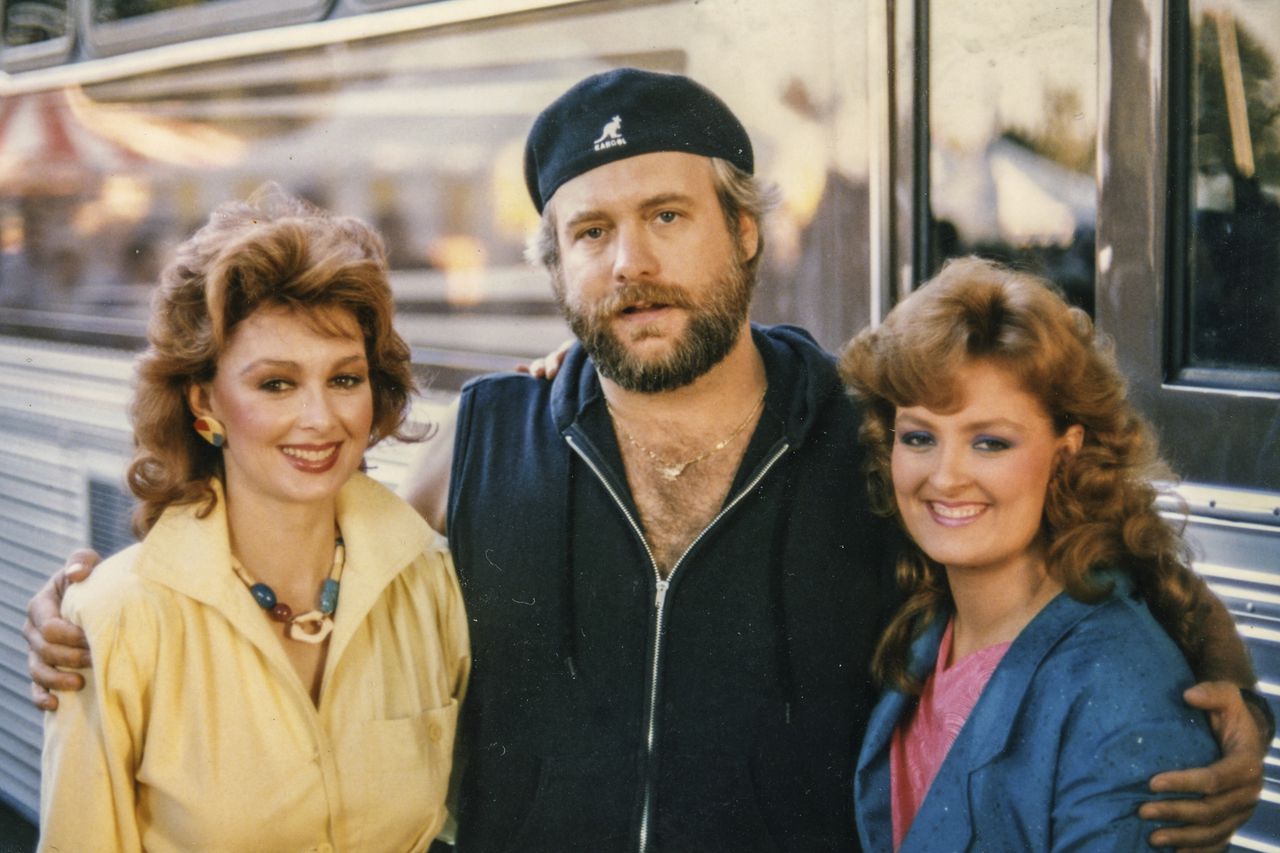
Blues musician “Microwave” Dave Gallaher with country stars Naomi, left, and Wynonna Judd at a 1985 festival. (Courtesy of Dave Gallaher)
Shows with The Judds
That show with Iron Maiden wasn’t the first time Gallaher shared the stage with incongruous stars. In the ‘80s, Gallaher was playing guitar with the Trasher Brothers, a Nashville gospel group with designs on crossing over to country. On a five-day run of circa-1985 shows in New England, Thrasher Brothers were the support act for The Judds, a rising country duo comprised of mom Naomi Judd and daughter Wynonna Judd.
“They were very nice and down to earth,” Gallaher recently recalled of The Judds back then, “Naomi, in particular, was just an angel.” Unfortunately, after battling mental illness for decades, Naomi Judd took her own life in April 2022.
Sharing the stage with Aretha
In the ‘60s before his Vietnam service, Gallaher was in Atlanta playing R&B music. His band The Majestics once shared a bill with a young Aretha Franklin, at local “chitlin circuit” venue The Royal Peacock.
“She had like a jazz trio with bass, a piano and drums,” Gallaher recalled in 2012. “That’s all she had. This was before her big R&B hits that established her as a star. When she came out to sing, her voice was just astounding and she also sat down and played piano on some stuff, which knocked everybody out as well.”
Offstage, Franklin was kind to the Majestics. She even signed a flyer from the show for Gallaher. He still has it to this day.
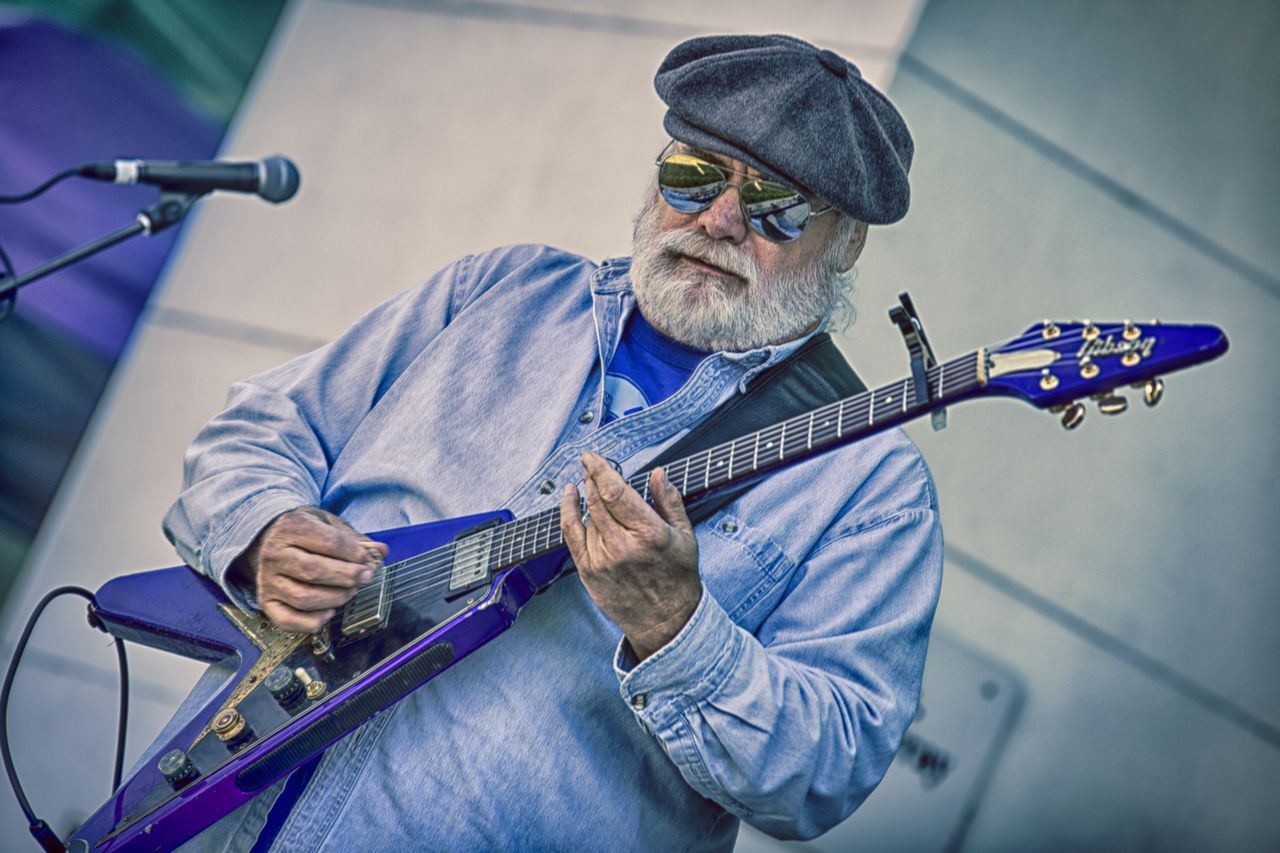
Alabama musician Microwave Dave, aka Dave Gallaher. (Courtesy Dennis Keim/ Microwave Dave Music Education)
Put me in, coach
Back in the day, minor league baseball team the Huntsville Stars enlisted Gallaher to perform “The Star-Spangled Banner” before a few games at Joe Davis Stadium. Instead of going for a dramatic Jimi Hendrix style psychedelic interpretation, Gallaher arranged the national anthem on slide guitar. A Microwave Dave bobblehead figure was given away at Joe Davis Stadium too. Those bobbleheads are now local collector’s items.
More recently, Gallaher has continued to represent the now-defunct Huntsville Stars onstage. He wore a Stars jersey onstage at the first Microwave Dave Day in 2015. This spring, Gallaher sported a Stars jersey during his memorable lead-guitar cameo for local alt-op singer Deqn Sue’s Orion Amphitheater set, during Orion’s opening celebration weekend.
In addition to his musicianship and musicologist-like knowledge, Gallaher is known for his heart. He’s supportive of other Huntsville musicians, particularly up and coming acts and musicians outside his genre, as well as music education.
Gallaher’s also known for his onstage look. The aviator sunglass. The newsboy cap. But most of all the overalls.
Gallaher began wearing his now-trademark overalls intermittently in the 1970s while performing with Cameron. In The Nukes’ early days, he switched gears and dressed to the nines. Eventually, Gallaher brought the overalls back, partly due to his woodworking day jobs.
“They were comfortable,” he told AL.com in 2015, “and if you had to stop what you were doing and get under the truck it was not a big deal.
The path to guitar
Born in Chicago and raised in Amarillo, Dallas and Houston, Gallaher’s first instrument was a ukulele. Unfortunately one morning when he was getting out of bed, a young Dave accidentally stepped right onto the uke, which was lying on the floor, and broke it.
His first guitar was his dad’s old Stella acoustic retrieved from the attic. Gallaher started off on guitar learning Buddy Holly tunes like “Peggy Sue.”
He first heard the blues via Houston radio station KYOK, which played hits by the likes of B.B. King and Jimmy Reed. Listening to those late-night blues shows was a way for Gallaher to ward of nighttime terrors.
As a youth, Gallaher took up the trumpet, then French horn and then the drums for his high school band. He ended up playing drums at home games for the Houston Oilers, in the American Football League team’s inaugural 1960 season.
“Music itself has leveled more paths for me than anything I can think of,” Gallaher told me in 2021. “It has created opportunities and it has paved over problems. Every turn of my life, there it is.”
Famous fan
Yours truly was slated to write the introduction to Gallaher’s book “I’m a Roadrunner,” until a slightly bigger name became available: Novelist Stephen King, the author of horror/fantasy best-sellers like “Carrie,” “It,” “Misery,” “Salem’s Lot,” “The Stand” and many others.
In late 2010, King touted Microwave Dave & The Nukes in his final column for Entertainment Weekly magazine. “That electric slide guitar will change your way of life,” King wrote. Gallaher still doesn’t know how King discovered The Nukes’ music but suspects it’s because he’s fond of colorful band names.
In 2014, King gave The Nukes props again. He included Microwave Dave track “Pay Bo Diddley” in a playlist of songs he listened to regularly while penning “Doctor Sleep,” the long-awaited sequel to “The Shining.” On Twitter, where King has more than 6 million followers, King posted, “Microwave Dave and the Nukes: Best slide guitar rock and roll since Lonesome George Thorogood and the Destroyers.” “It gave is a kind of credibility, that he found something in us worthy of his attention,” Gallaher said. “I was amazed.”
King came through again for “I’m a Roadrunner,” which contains more than 100 photos from throughout Gallaher’s life and thoughtful essays by Patricia Sammon culled from her interviews with Gallaher. King’s predictably great intro closes with, “If you play the music, or if you just love the music, you’re going to love this book. God bless Microwave Dave.”
